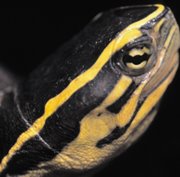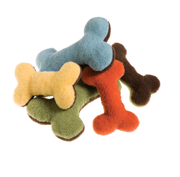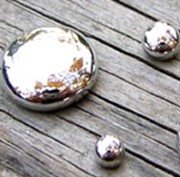 The fashion industry has traditionally had a lot to answer for when it comes to environmental responsibility. According to the US Council for Textile Recycling, 68 pounds per person of textiles are thrown out each year in the US alone, most destined for landfills.
The fashion industry has traditionally had a lot to answer for when it comes to environmental responsibility. According to the US Council for Textile Recycling, 68 pounds per person of textiles are thrown out each year in the US alone, most destined for landfills. While natural fibres like cotton may seem an ecologically sound choice, many methods used in textile production - such as the use of carcinogenic pesticides - have a hugely damaging human and environmental impact, while a hefty carbon footprint is generated by manufacturing and shipping.
In keeping with an increased global awareness of environmental issues, a growing number of designers are working with sustainable, organic and recycled fabrics such as organic cotton, hemp and bamboo to create unique designs that put paid to the stigma attached to eco-clothing. The emphasis is on quality pieces that will last – a contrast to “fast fashion” and “disposable” clothes.
Greened! spoke with Kerry MacMullin, owner of ethical and eco-friendly clothing and accessories store green is black, about bringing green garments into the fashion mainstream.
G: What led you to start green is black?
KM: I started the business because, after long boycotting all new clothing (in favour of second-hand shopping) due to the questionable labour practices and environmentally irresponsible textiles, I was frustrated that there was nowhere that I could find those things that were un-findable at second-hand stores, and had nowhere to send people who saw my lifestyle and wanted to make changes, but still wanted to buy new.
 G: What in particular do you dislike about the mainstream clothing industry with regard to the environment?
G: What in particular do you dislike about the mainstream clothing industry with regard to the environment?KM: Two aspects top the list for me. Firstly, the fabrics - synthetic fabrics like polyester and nylon are petrochemical by-products, and regular cotton (not organic) accounts for just under 25 per cent of all the insecticides used globally. Also, by outsourcing the manufacturing to China the textiles cross the ocean twice - which requires a lot of fuel.
G: You started out as an online store - what prompted you to open a real-world store?
KM: Interestingly, green is black is soon going to go back to being chiefly an online store (we are closing the doors on March 28). I wanted people to have a chance to look at, touch and try on the eco-ethical fashions that are largely only available online. I wanted the concept to be out there and visible so that people would be encouraged to ask questions and give feedback. Selfishly, I wanted the opportunity to interface with like-minded individuals. And trying to get press for an online business is hard; with a storefront it's a lot easier. Press for a business of this nature is absolutely integral to its success. The store front is no longer economically possible; plus I need more time to dedicate to developing a line of accessories made with reclaimed and recycled materials.
 G: What green initiatives have you taken in running your store?
G: What green initiatives have you taken in running your store?KM: I power the building with Bullfrog Power, carbon offset all of my energy usage and shipping with Zero Footprint, and use a paper-free credit card transaction system. There are also the little things: all the fixtures (display pieces, racks) in the store are second-hand, all our hangers are wooden - some vintage - we don't fax, rarely print, use a laptop instead of an energy-guzzling desktop and we don't air condition the store in the summer.
G: Do you have any new lines/labels coming in that you're particularly excited about?
KM: I'm really excited about TOMS shoes - we have them coming in in a few weeks’ time. For every pair that is purchased in the developed world a pair of shoes is donated to a developing nation. Their ridiculously hot boots were developed because they needed a higher-end product in order to fund the donation of a special boot, needed in a region of Ethiopia where there is a soil-borne pathogen.
G: Which celebrity would you most like to dress in green is black clothing?
KM: I'm going to say Madonna. She's the most influential of those who made PETA's worst-dressed list for 2009. She's a timeless beauty, so it would be nice to see her wearing and endorsing eco-ethical fashion.
Items pictured are available from greenisblack.ca, or at green is black, 624 Yonge St., Toronto.











No comments:
Post a Comment